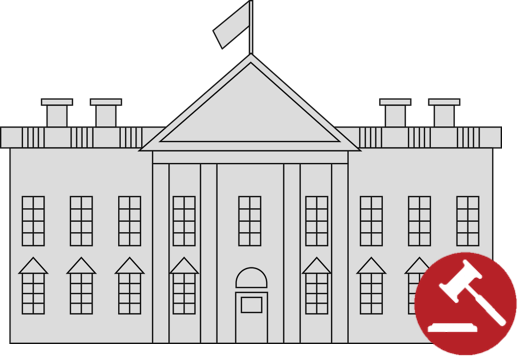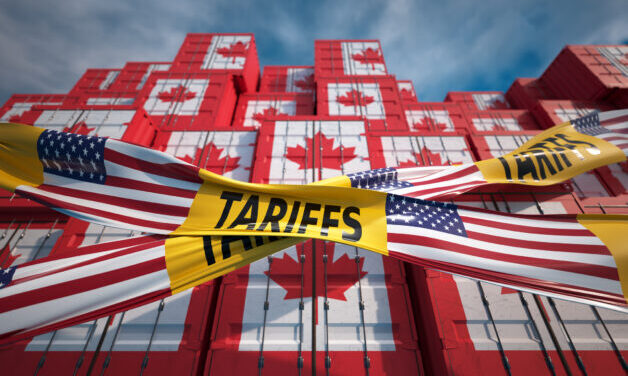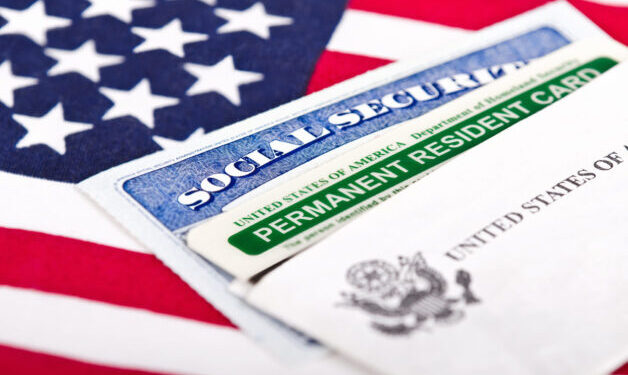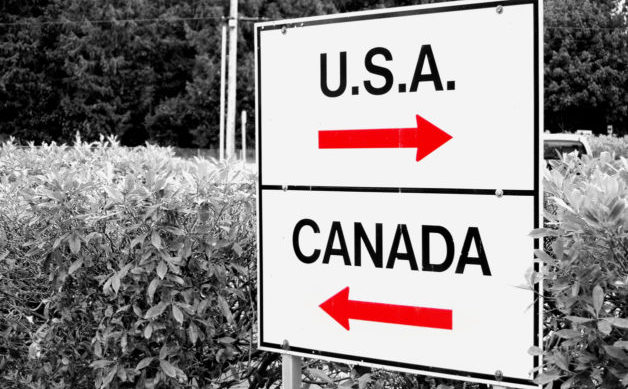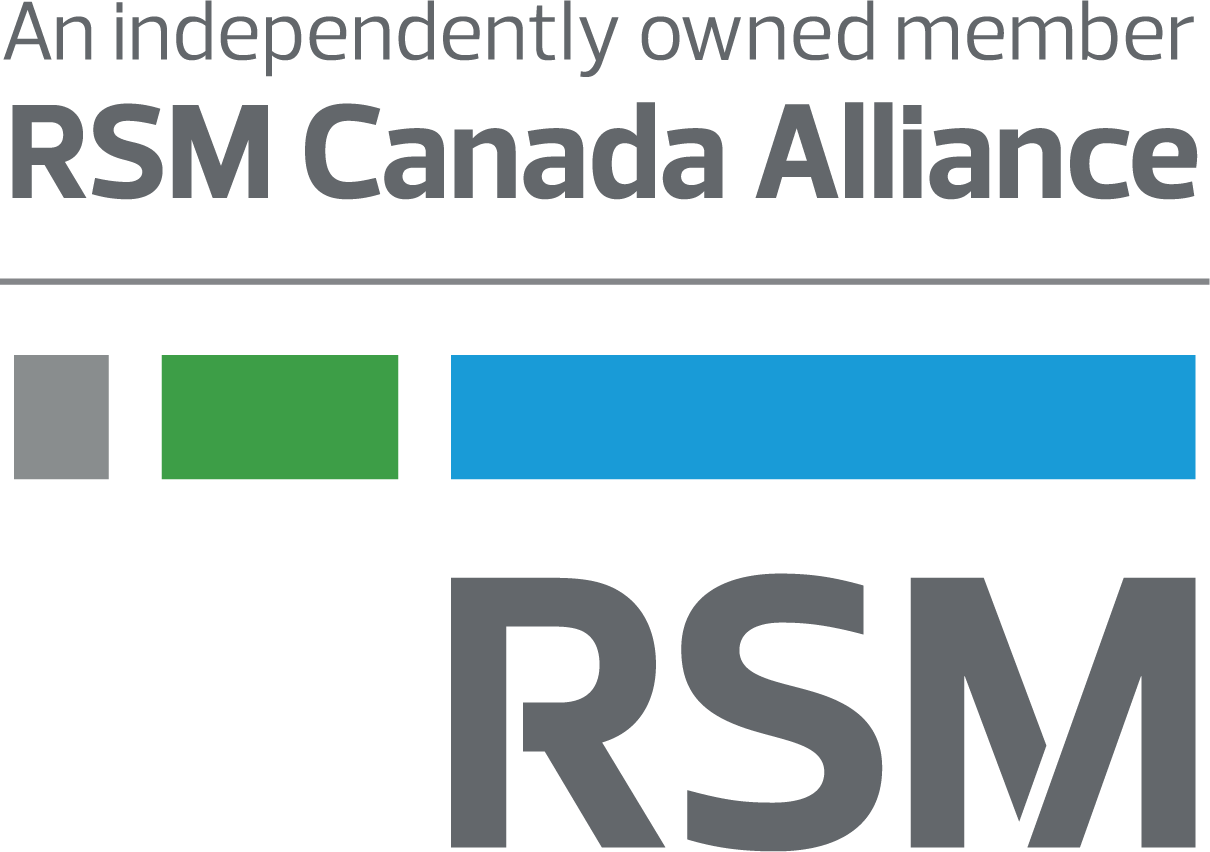After a weekend that saw U.S. President Donald Trump impose steep tariffs on Canadian goods and Prime Minister Justin Trudeau put forward retaliatory measures, the widely feared tariff war appears on hold after meetings between the two leaders on Monday.
Instead of taking effect Tuesday, implementation of tariffs will be paused by 30 days after Canada made additional commitments to invest in border security.
While businesses and consumers may welcome this reprieve, the back-and-forth between the longtime trading partners laid bare Canada’s economic vulnerability amid ongoing political volatility.
The U.S. tariffs set to take effect in 30 days include an additional 25% tariff on nearly all Canadian goods—with a 10% tariff on energy products.
In response, Canada’s retaliatory measures included a 25% tariff on $155 billion worth of goods from the U.S. The first phase would include tariffs on $30 billion in U.S. goods; the second phase would take effect 21 days after.
The U.S. also introduced a 10% tariff on all products from China. While Trump initially announced a 25% tariff on all goods from Mexico, its implementation was delayed for a month after meeting with Mexican President Claudia Sheinbaum.
Canada, Mexico, and China comprise more than 40% of all U.S. imports.
If the tariffs take effect after the pause, they will affect all countries involved—including pushing Canada into a recession, adding inflationary pressures, and leading to job losses. This comes after Canada managed to lower inflation to the Bank of Canada’s target last year without tipping the economy into a recession.
Despite the intercession, Canada should consider re-evaluating its trade relationships. Strategies that could address this include expanding and strengthening trade relations with other countries and removing interprovincial trade barriers to allow more seamless domestic trade.
Although there will be increased costs in the short-to-medium term, diversification to de-risk is a lesson from the COVID-19 pandemic that can prove useful now.

Dire economic impacts
U.S. tariffs and Canada’s retaliation would lead to a 2% reduction in the Canadian economy, down from a projected growth rate of 1.8% this year.
The measures by both sides could also lift inflation from the current 2% to a 2.7% headline number as Canadian consumers end up bearing some of the increased costs from tariffs.
The depreciation of the Canadian dollar could mitigate the prices of exports for U.S. importers, but this exacerbates the pain for Canadian businesses and consumers.
Industries that are highly integrated across borders, including auto manufacturing and even agriculture, could come to a standstill rapidly if tariffs are implemented.
Job losses should be expected across Canadian industries, from manufacturing to tourism to transportation. Higher prices decrease demand, which means aggregate demand for goods across the U.S. and Canada would drop, leading to fewer jobs.
For Canadian households, this means an increase in prices of multiple consumer goods like groceries, appliances, and especially vehicles.
Prices of perishable goods such as fruits and vegetables are likely to jump quickly if tariffs are enacted, given that they cannot be stockpiled in advance.
Although the price of goods like appliances and cars would take longer to increase, they will inevitably rise if tariffs take effect.
Despite the pause, Canada should consider re-evaluating its trade relationships
In addition to higher prices, expect a smaller selection of available goods should tariffs come into force—especially fewer U.S.-made products in stores.
Businesses that are the most vulnerable to tariffs are those that frequently import and export their goods and are part of a highly integrated supply chain. This burden will be acutely felt in situations where it’s possible that goods will be subject to tariffs each time they cross the border.
Companies that produce goods in one country and sell in another, such as Canadian manufacturers that sell to U.S. consumers, would also take a hit.
Other businesses likely to be strained by tariffs are those with tight margins and without healthy cash reserves. They may be forced to pass on the costs to consumers and might run into cash-flow issues since they must pay the tariffs upfront and might not receive payments until much later.
Canada’s response
Should the U.S. follow through on tariffs after 30 days, Canada’s response would be much more targeted. Its two-wave approach allows businesses to stock up in advance, mitigating the impact on Canadian businesses.
Goods targeted in the first round include orange juice, peanut butter, alcohol, and apparel, which are not top imports from the U.S. into Canada.
Canada has close substitutes produced domestically and also imports products like apparel from countries such as China or Vietnam. This strategy could help mitigate the immediate hit to consumers’ wallets as many are likely to switch to non-U.S. substitutes.
But Canada’s later wave of tariffs includes top imports from the U.S. like passenger vehicles, aerospace products, trucks, and buses. In addition to significant supply chain disruptions, consumers can expect to see auto prices go up substantially.

Before the pause was announced, individual provinces implemented non-tariff responses to the U.S. measures.
Alcohol is one product where there are plenty of domestic options and non-U.S. import substitutes, meaning Canada’s decision is designed to hurt U.S. producers without causing too much pain to local consumers.
Additional insights
The Canadian dollar is expected to slide further to mitigate the impact of tariffs on Canadian exports to the U.S. in the event tariffs take effect. Previously, tariff threats pushed the loonie from 0.72 US before the election to 0.69 US—a level not seen since the early days of the pandemic.
While the depreciation of the Canadian dollar would make imports more expensive for Canadians, the net effect on inflation is far from one-to-one. The economic blow from tariffs would decrease aggregate demand, keeping prices from rising too much.
In the short-to-medium run, most of the increase in prices would be borne by consumers, not exporters.

The impact of tariffs extends beyond traded goods between Canada and the U.S. The unemployment rate would spike as jobs are lost, which lowers demand for all goods and services like new cars, dining out, and entertainment. Restaurants, hotels, and other services in border towns will be particularly hard hit.
The effect on each industry and each good depends on whether there are close Canadian substitutes to U.S. imports and how well supply chains can work around tariffs. For example, tariffs and retaliation would devastate auto companies in Canada, the U.S., and Mexico and leave them unable to compete with businesses in Asia or Europe.
The takeaway
Trudeau and Trump may have agreed to a pause, but the threat of a puzzling, lose-lose trade war launched by the Trump administration remains a serious concern.
If U.S. tariffs do take effect and Canada responds in kind, the disruption will slash billions of dollars from Canada’s Gross Domestic Product (GDP) this year and can hurt businesses and households in Canada, Mexico, and the U.S.
If tariffs turn out to be long-lasting, they will present another complete disruption to the Canadian economy and supply chains—a second in five years following the pandemic.
The scenario in which economic damage is minimized is one in which a trade agreement is negotiated, putting an end to tariffs. The longer tariffs and retaliation continue, the more fractured and uncompetitive the three countries’ economies become—and the more economic pain consumers would feel from higher prices, fewer goods available and fewer jobs.
This article was written by Tu Nguyen and originally appeared on 2025-02-03. Reprinted with permission from RSM Canada LLP.
© 2024 RSM Canada LLP. All rights reserved. https://realeconomy.rsmus.com/trump-tariffs-canada-response
RSM Canada LLP is a limited liability partnership that provides public accounting services and is the Canadian member firm of RSM International, a global network of independent assurance, tax and consulting firms. RSM Canada Consulting LP is a limited partnership that provides consulting services and is an affiliate of RSM US LLP, a member firm of RSM International. The member firms of RSM International collaborate to provide services to global clients but are separate and distinct legal entities that cannot obligate each other. Each member firm is responsible only for its own acts and omissions, and not those of any other party. Visit rsmcanada.com/about for more information regarding RSM Canada and RSM International.

